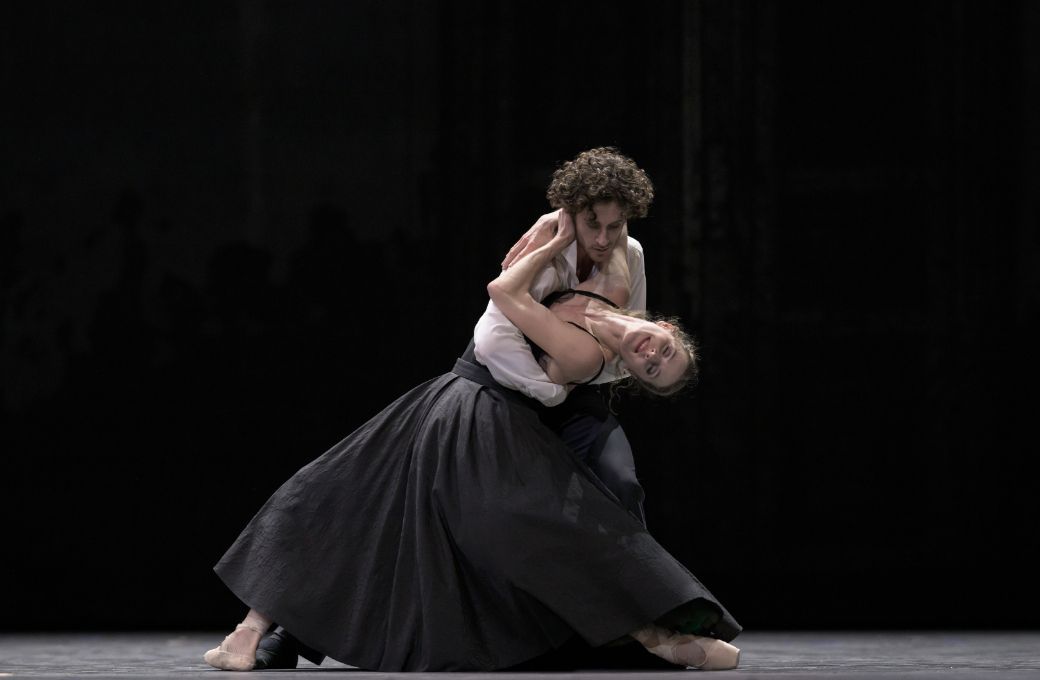Newly appointed Director of Staatsballett Berlin, Christian Spuck makes his mark with this season opener, a world premiere of Bovary, a ballet based on Gustave Flaubert’s classic, but scandalous novel of 1856. It is the first of four new works that will feature over the course of the season after a successful tenure for Spuck at Ballet Zurich.

Having experienced most of the Staatsballett’s offering during and since the pandemic years there was a tried and tested formula of classic stalwarts: The Sleeping Beauty, Swan Lake and Giselle, alongside popular contemporary choreographers Sharon Eyal, Mats Ek presenting shorter pieces, Bovary is an exciting departure. The company thrives tackling a new narrative for ballet and perhaps more importantly, I observed a distinctly more populated theatre than on previous occasions for this early performance in the run.
The various elements of Spuck’s Bovary, spoken word, choreography, music, video projections (Tieni Burkhalter) and beautifully detailed costumes (Emma Ryott) come together to create some fully realised escapism. At the centre of it all is Weronika Frodyma (still only a soloist with the company) as Emma Bovary in what is surely a career defining role. It’s demanding beyond words, the female protagonist barely ever leaves the stage, especially in Act II. The physical strain she endures over two hours, jumping (quite literally) from partner to partner, contrasts with the ease with which we can understand her through an expression or gesture to her husband, Charles (Alexei Orlenco). They are together but disconnected, inhibiting different worlds.
The curtain rises to the same sight it also comes down to, of Charles Bovary and the couple’s maid Félicité who are framed by mournful figures in black veils. We all know how this is ending, but the image is a powerful one. This clarity of storytelling continues throughout. Marina Frenk recites excerpts of Flaubert’s novel in German, (translated into English above the stage) which isn’t necessarily required for a plot that is relatively straight forward but the beauty of Flaubert’s writing encourages us to revisit the novel we might have encountered in the past.
The couple’s stilted marriage ceremony is a countryside affair surrounded by the corps de ballet in rustic colours, far more flamboyant than the rigid bride and groom; an expressionless Emma and an unaware Charles. In contrast, Frodyma’s Bovary comes alive in the opulent and beautifully staged ball scene with gowns of metallic silver and gold. Her euphoria is evident in the way she glides around without her husband who, unconcerned, watches her from afar. Her characterisation is easy to follow, her immature romanticism, boredom and materialistic tendencies present from the moment she sets eyes on her first lover, Leon (Alexandre Cagnat).
Later, Spuck skillfully clears the stage from large ensemble scenes to give way to the pas de deux that are so vital. Emma develops from tentative adulteress to something more unhinged across the two hours, evident in the way she initiates her relationships. These first encounters are more chaste and curious before she conducts herself with more wild abandon in her affair with Rudolphe (a brooding David Soares).
Charles Bovary could be a one dimensional character and he is, to an extent. However, the audience's feelings towards the country doctor develop over the acts. He begins their marriage as a glorified prop, dimly unaware and easily satisfied, but as Emma’s behaviour grows more erratic and he seeks to understand her whilst remaining faithful, Orlenco is a caring partner in the final moments he shares with his wife, and we feel sorry for him.
Frodyma’s most arduous moment comes in her dramatic decline that sees her, mentally disturbed, reaching for a jar of arsenic with a trembling hand. The scene is long and she must retain the audience's engagement for her prolonged death. Erratically she moves, jumping from Charles’s arms, the floor, standing, shaking, to a chair, weaker in her pointe shoes until she can continue no more, floundering in a floor length white gown that envelopes her weakened frame.
There’s a lot to absorb in Spuck’s Bovary and the elements could surely all be appreciated on a second viewing, but it’s a riveting watch. This narrative-driven ballet would lend itself surely to an interpretation from Northern Ballet or other companies of great storytellers, with plenty for both the corps and the principals to work with.
It’s a full evening, just shy of two and a half hours and although there’s not much “spare” content, a few of the earlier scene setting moments could be shorter to hook the audience in more quickly as we wait for, let’s face it, the scandal to ensue. With just six more performances in this brief run, Bovary deserves more favourable programming so a wider audience can enjoy the drama.


